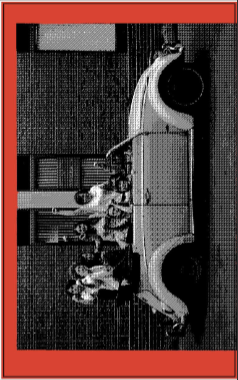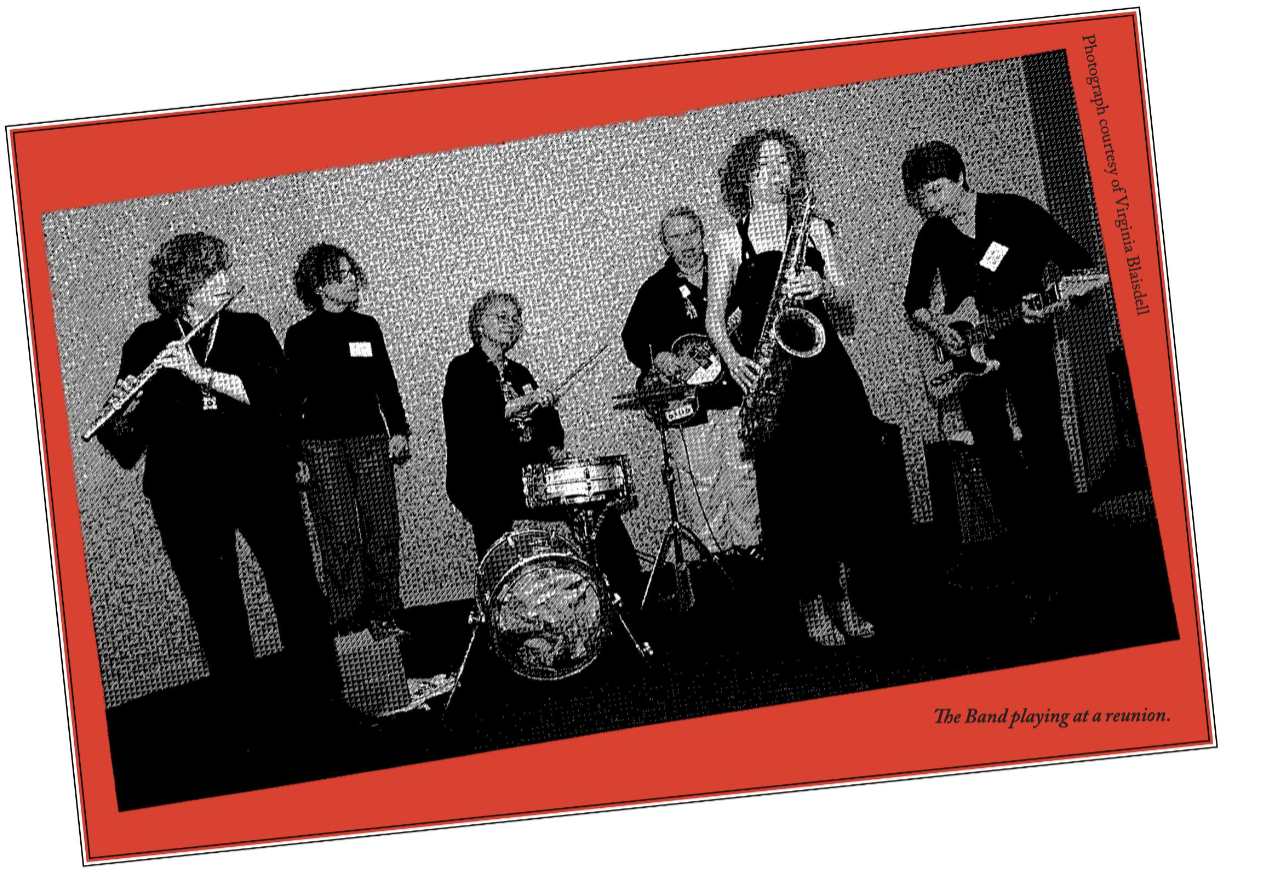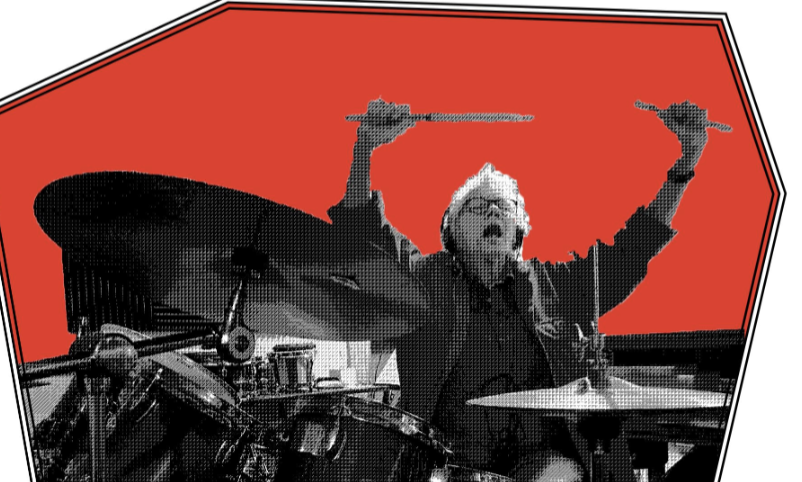“We’ve got to control our own lives,” Jennifer Abod sings. Her voice, sharp and convincing, crescendos. “Free our sisters! Abortion is a right!”
Virginia Blaisdell delivers the final riff on her French horn. Judy Miller strikes the last note on her cymbal and smiles. Rika Alper cracks a joke and tunes her guitar. Kit McClure distributes papers with the lyrics to the next song. “Sing along!” Leah Margulies shouts. Their audience of women, standing shoulder to shoulder, roars.
It’s midnight on Wednesday in the summer of 1970. At Yale’s Delta Kappa Epsilon fraternity house, students experience something like never before—the debut of the New Haven Women’s Liberation Rock Band.

Six months before this performance, the soon-to-be bandmates had met at the Free Women’s Conference, a two-day event consisting of feminist speeches and discussions in which over three hundred women participated. The event sought to recruit new activists for the New Haven women’s movement, a group that emerged in 1966 out of frustration with the male-dominated American Independence Movement. Both the Conference and the Band underpinned the second-wave feminism movement, a period of advocacy for women’s equality and visibility—primarily for the wealthy and white.
Among them was Kit McClure ’75, a first-year in Yale College’s first co-educational class in 1969 and the sole female member of the Yale Precision Marching Band in 1970. But after a male student forcibly picked her up and carried her across a football field, she quit. She’d also left the Directed Studies program, frustrated by the male students who talked over her in class.
In 1970, Rika Alper was invited to the Free Women’s Conference to speak about the feminist struggle rampant within the anti-war movement. Having grown up playing folk guitar, Alper always fantasized about running away and joining a rock band.
When Leah Margulies spotted McClure at the Conference, she had already heard a rumor about a red-headed first-year at Yale with rock band experience. Marguiles moved to New Haven in 1968 and started practicing the flute along the way. She yearned to play in an all-female band.
Virginia “Ginny” Blaisdell went to the Conference because “everyone was.” Her best friend, Naomi Weisstein, was a speaker at the Conference and would go on to start the Chicago Women’s Liberation Rock Band at the same time the New Haven chapter came together. The sister bands remained in close contact throughout their careers—it didn’t hurt either that New Haven’s Jennifer Abod and Chicago’s Susan Abod were sisters.
Eight women in their early 20s made up the New Haven Women’s Liberation Rock Band. The other core members were Harriet Cohen, who played guitar, Florika Remetier and Pat Ouellette, who played bass, and Judy Miller, who played drums. Kate Field and Anna Tsing Lowenhaupt ’73—who, like McClure, were also in Yale’s first class of women—joined briefly.
The women were united by their disgust with the blatant sexism of rock music. Weisstein and Blaisdell explained this feeling in their 1972 article, “Feminist Rock: No More Balls and Chains” for Ms. magazine: “Rock has become more blatantly, menacingly sexist than anything that had preceded it.”
In the late nineteen-sixties and early nineteen-seventies, rock music championed rugged masculinity. Groups like The Rolling Stones and Led Zeppelin created what critics termed “cock rock”—aggressively asserting masculinity by standing with their legs wide open, mimicking sex with their guitars, and singing about empty-minded, sexually subservient girls. The Rolling Stones’ “Under My Thumb,” for example, compares a girl to “a squirming dog” and “Siamese cat” that “does just what she’s told…under my thumb.” In 1967, Jimi Hendrix pretended to rape his guitar on stage. Cock rock’s sexual aggression extended beyond lyrics and performances and reflected the prevalent sexual violence women endured. In 1968, at the Sky River rock festival, three women were gang raped and one woman was stabbed while trying to escape.
Even amid this hostile landscape, the New Haven Liberation Band’s first concert at Delta Kappa Epsilon was an uproarious success. The band distributed tambourines and lyric sheets, performed comedy and theater, and spoke candidly to their audience mid-performance. By refusing to distance themselves as rock stars, they engaged their audience as equals. The Band reinvented the rock concert experience from a spectator sport to a participatory celebration. In 1976, Blaisdell wrote in Sister, New Haven’s first feminist magazine, that the band “had somehow momentarily succeeded in creating an event that incorporated [their] vision of a better society because it changed the way performers and audiences behaved with each other.”
***
The Band challenged the sexism of rock music by inserting their feminist, affirmative, and humanitarian visions. “We were first and most necessarily feminists. Only second were we musicians,” Blaisdell wrote in 1976.
In their Ms. magazine article, Weisstein and Blaisdell defined their music as “musical organizing.” Through their lyrics, they deconstructed women’s oppression in order to empower them. The Band sang about the wholehearted female experience: “…our strengths and dignity and courage and humor and honor and love and uniqueness and wisdom, our joy as well as our pain.”
Songs emphasized everything from resistance to solidarity. In “Sister Witch,” the Band sings, “When I feel my sister’s embrace, there’s all the space and the love that I need. Yes, we need each other.”
But to combat sexism, the Band wanted to do more than subvert lyrics. They wanted, as Weisstein and Blaisdell wrote, to “demystify the priesthood of the instrument and the amplifier.”
Because women playing music, especially rock music, was unheard of at the time, the Band, by playing their instruments, moving and fixing their equipment, and recording by themselves, wished to strengthen female autonomy and self-confidence.
“It’s hard to imagine how much of a man’s world it was at that time,” Alper said. “It was almost as if women were like cows or horses or some species that couldn’t possibly figure out how to play an electric guitar.”
When the Band played at women’s conferences, they would often hold workshops afterward on how to play rock music with their own instruments.

“Our mission was to open the rock music world to women and show them that they could be rock musicians too,” Marguiles explained.
For the members who had never played rock music or been inside a recording studio before, McClure, Florika, and Blaisdell—who each previously had ten to twenty years of training—acted as their mentors, writing songs and teaching their less-experienced members how to perform.
***
Throughout the Band’s four-year course, members’ personal lives were intrinsically linked with the intersectional causes they championed. Influenced by the gay liberation movement, some members saw same-sex relationships as the logical answer to their past romantic struggles with men and their feminist resistance.
Everyone broke up with their former partners and experimented with their sexualities. “I played with whoever I wanted to,” Blaisdell said. She divorced her husband. Marguiles ended her marriage to explore polygamous and lesbian relationships. Alper broke up with her boyfriend. Abod came out as a lesbian. McClure frequented a gay bar near Yale.
“We talked about how oppressed we were and how much men suck,” Alper described. “It was very disruptive and upsetting. There were a lot of hurt feelings and conflict. Nothing about our lives was placid.”
Many of the women also joined feminist consciousness-raising groups, tight-knit clusters of women that would speak and share their intimate feelings and needs.
While some of the members were close friends or had romantic relationships with one another, other members of the Band merely tolerated one another or didn’t get along as well. Despite their enlivening and exhilarating performances on stage, the Band frequently fought off stage.
“It was pandemonium,” Rika said. “We fought about everything and nothing.”
When Marguiles married in 1968, her parents offered to either give her some money or pay for an elaborate wedding. Marguiles chose the money and bought a van for the Band. The Band agreed that all money earned from their gigs would be used communally on food, equipment, and transportation expenses. They charged each audience member only the amount they could afford to pay. “There was no financial interest,” Alper said.
***
On December 13, 1970, the Band had the unforgettable thrill of performing at a prison in Niantic, Connecticut. Blaisdell wrote, “The [prison] was buzzing with an incipient political consciousness.” Two to three hundred incarcerated people, mostly young Black women, sat in the gym, bobbing up and down and yelling in their seats. They were not allowed to dance, but they did so nonetheless. Every time a guard motioned for one dancer to sit down, another dancer would pop up on the other side of the room.
One of these women was Ericka Huggins, a leading member of the Black Panther Party, who wrote a poem inspired by the performance. She describes the solidarity she felt blossom across racial lines: “it was all a total exchange / of energy…they sang / and our voices answered their guitars…a feeling there that one day—soon— / all people will be free…we left / stronger / able to smile.”
Moved by the crowd’s energy in defiance of the guards, the Band extended their performance until the prison matron made them stop.
But at Cornell University, where the New Haven Band played alongside the Chicago Band, the women’s presence provoked outrage. Most of the all-female audience took their shirts off mid-performance. Male students at Cornell—overhearing this and feeling enraged by what they felt was exclusion—stormed the concert venue, calling the Band members “cunts” and hurling things at them. Police were called to evacuate the Band and the attendees. Despite this incident, the Band still received overwhelmingly positive responses from their female audiences.
“People were thrilled with us,” Alper said. “It was so novel to hear music with these types of lyrics and to see women jumping up and down with an electric instrument.” The Band developed a loyal, young, and female New Haven fan base that would follow them to every concert, which stunned the members. “It seems magical that people knew we were playing in another city,” Alper said.
In the fall of 1971, Marian Levy approached McClure at a concert and asked if the Band was interested in making a record. Levy was the co-founder of Rounder Records, a self-described “political collective as well as a record company.” The Band agreed but felt completely unprepared. “The idea was preposterous and terrifying,” Blaisdell wrote. “We were so perplexed by the enormity of the idea and also anxious to talk about the political implications of what we had been doing for a year.”
The New Haven chapter of the Band was then invited to a recording studio in Southboro, Massachusetts for a weekend to record the album alongside their Chicagoan counterpart. Levy left the two bands to themselves, saying, “It was also part of the political point being made, which is that women can not only make their own music, they can have creative control over their own music. And so, they did.”
In 1972, the New Haven and Chicago Women’s Liberation Rock Bands released their sole album, Mountain Moving Day, which sold a few thousand copies across college towns and feminist bookstores.
***
In 1973, the Band was invited by The Furies Collective, a group of lesbian separatists that viewed lesbianism as a political decision, to Washington D.C. to play for what they assumed was a public dance. But it was the Furies’ private party, the Band realized.
Outraged, Blaisdell saw the incident as a sign that the movement “began to therapize itself” and that women would choose their personal pursuits over collective activism. She wrote, “We considered ourselves the ‘cultural arm’ of feminism, but it wasn’t clear that feminism wanted such an arm or knew what to do with it.”
By 1974, as the feminist movement waned, members of the New Haven Women’s Liberation Rock Band no longer felt they were fulfilling their purpose. “Our era was coming to an end,” Rika said. “Roe v. Wade was passed. The anti-war movement was coming to a close.”
The Band was splintering. During her time with the Band, Marguiles became a member of Sullivanian Therapy, a cult that practiced radical psychoanalysis, communal living, and polygamy, and refused to compromise with other members who didn’t support her beliefs. Unbeknownst to the other members, McClure struggled with alcohol and substance abuse. Eventually, encouraged by a psychology student at Yale, McClure sought therapy in New York and could no longer play in the New Haven Band. In 1974, four years after its founding, the original New Haven Women’s Liberation Rock Band disbanded.

Only Blaisdell and Abod hoped to continue playing, so they put out advertisements in Ms. and Sister to find new members for a more musical and less political band. “The new band sounded immensely better than the old one,” Blaisdell wrote. “But there were problems.” By 1976, because the women’s movement was holding fewer conferences and events, the Band struggled to find gigs and eventually dissolved.
While the heart of the Band lingers with the members, they’ve since found their own paths. Abod went on to anchor The Jennifer Abod Show, the first nightly AM radio program with a female host, to found a feminist-centered production company, and to teach as a professor in universities across the Northeast. Alper, though still passionate about music, realized that she is more skilled as a developmental psychologist. Marguiles went to law school and practices law to this day, her activist spirit strong as ever.
McClure kept at her musical dreams. She became the first woman to graduate with a master’s degree in saxophone performance from the Manhattan School of Music. After juggling jobs as a music teacher at five different New York City schools, she founded the Kit McClure Band, an all-female jazz band that went on to play sold-out venues throughout the Northeast United States, Europe, and Japan. She is 72 and resides in Manhattan with her husband of eighteen years.
Blaisdell remained in New Haven, working at the New Haven Independent and serving on the editorial board for Sister. To her, the shortness of the Band’s tenure meant that they were unable to accomplish their mission of radicalizing rock music. The end of the women’s movement marked an end to the Band. “We blew it,” Blaisdell wrote. “Without a movement, an assault against the cultural forms of our society will fail.”
But hope glowed through Blaisdell’s disappointment—even as they disbanded, something greater had been set in motion.
Abod said, “We had a right to do this, and it might not have come out as well as we wanted. The people after us will do it better, but we had to do it for the first time.”
While the band has not performed publicly in almost fifty years, their legacy carries on within Connecticut’s music scene and within Yale. East Rock House celebrates and spotlights queer and trans musicians by hosting events like the Trans 4 Trans music festival. Space Ballroom fosters an inclusive space dedicated to musical freedom and personal expression. Tarek, the lead singer of the hardcore punk band Intercourse, said that Connecticut treasures a prominent experimental punk scene that counters traditional exclusive and masculine rock.
Today, Blaisdell is 83 and lives with her partner, historian and professor Amy Kesselman. Her home—and its bookshelves stocked from floor to ceiling, a room dedicated to her drum set and dozens of her used cameras, and a refrigerator covered in political magnets––still bursts with her youthful dynamism.
“There wouldn’t be women [at Yale] today if people hadn’t pushed the crap out of it,” Blaisdell said. Her Band’s radical humanitarian and utopic vision still lingers in New Haven today.
-Sophia Liu is a first-year in Berkeley College.
Photography: Drum photo courtesy of Etai Smotrich-Barr; reunion performance photo courtesy of Virginia Blaisdell.

